前景实用英语 2 unit 1 lifelong learning
前景实用英语教案

教案首页2021-2021 学年第一学期专业:课程名称:高职英语班级:主讲教师:Unit 1 CollegePeriod 1-2Part A Lead-in and Text ATeaching aims:1.Help freshmen get familiar with the studies and lives in college and discuss about it;2.Master the useful words and expressions in Text A;Teaching important points:1. Ss. Learn some new words and use them in the discussion2.New words and expressions in Text ATeaching difficult points:Ss. Learn how to talk about college lifeTeaching steps:Step 1Greetings and a brief introduction of English learning scheduleStep 2 Lead-in1.Warm-up questions:Do you like your college life? What differences are there between college and high school life?2.Study the pictures on page 2 and discuss the questions below in small groups.1)Who are the people in each picture? What’s their relationship?Cues: students, classmates, sports friends2)Where are they? What are they doing?Cues: classroom, football field, library, listening, playing, looking for3)Do you think they enjoy what they are doing now?Cues: very much so, not at allStep 3 SpeakingReview the sentences drills about greeting and introduction; let some pairs practice them Step 4 Listening1.Read the instruction as a class.2.Play the recording twice, and check Ss’Exs. and repeat some sentences ifnecessaryanize a class discussion based on this task. Then ask Ss. to think aboutmethods to improve their English listening skills.Step 5 Text A1.Ss. learn some words and phases from vocabulary2.Lead-in1)Warm-up questions.e.g. Do you think Chinese college life is very different from western one?2) A brief introduction of American college life to arouse Ss’ interest3.ScanningAsk Ss. read the Text very quickly and get the main idea.4.Ss. finish the Task 1 and then check the answersStep 6 H.WFinish Task 2-4 on page 10-12Period 3-4Text A :The Freshman Experiences: College is not summer camp Teaching aims:1. understand the passage pletely;2. master the key words, expressions & sentence patterns in Text ATeaching important points:1. the structure of the Text A2. New words and expressions in Text ATeaching difficult points:understand the passage pletelyTeaching steps:Step 1 GreetingStep 2 Revision and Check the answers from Task 2-4Step 3 scanningSs. read the text again and find some difficult sentences to ask for help ;Teachers and Ss. solve these difficulties togetherStep 4 Intensive readingList some language points –some important words and difficult sentences1. imaginev. to form a picture in your mind of what something might bee.g. She imagined singing her favorite song on a big stage.她想象着自己在一个巨大的舞台上唱自己最喜欢的歌曲。
前景实用英语综合教程2unit1
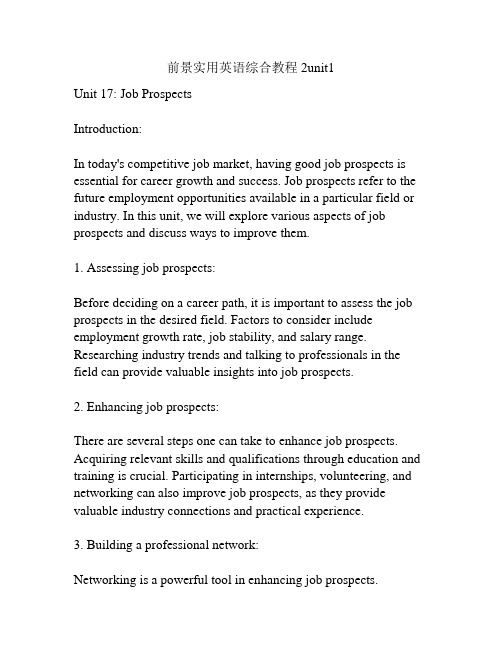
前景实用英语综合教程2unit1Unit 17: Job ProspectsIntroduction:In today's competitive job market, having good job prospects is essential for career growth and success. Job prospects refer to the future employment opportunities available in a particular field or industry. In this unit, we will explore various aspects of job prospects and discuss ways to improve them.1. Assessing job prospects:Before deciding on a career path, it is important to assess the job prospects in the desired field. Factors to consider include employment growth rate, job stability, and salary range. Researching industry trends and talking to professionals in the field can provide valuable insights into job prospects.2. Enhancing job prospects:There are several steps one can take to enhance job prospects. Acquiring relevant skills and qualifications through education and training is crucial. Participating in internships, volunteering, and networking can also improve job prospects, as they provide valuable industry connections and practical experience.3. Building a professional network:Networking is a powerful tool in enhancing job prospects.Attending industry events, joining professional associations, and utilizing online platforms like LinkedIn can help build a strong network. Networking provides opportunities to connect with professionals in the field, learn from their experiences, and gain insider knowledge about job opportunities.4. Developing transferable skills:Transferable skills are abilities that can be applied across different professions and industries. Developing these skills can significantly improve job prospects. Examples of transferable skills include communication, problem-solving, and leadership abilities. Identifying and highlighting these skills in a resume or job application can make a candidate more marketable.5. Keeping up with industry trends:Staying updated with industry trends and advancements is essential for job prospects. This can be achieved by reading industry publications, attending conferences and workshops, and staying connected with professionals in the field. Knowledge of current trends and emerging technologies can make a candidate stand out in the job market.6. Embracing lifelong learning:In today's fast-paced and ever-changing world, continuous learning is essential for career growth. Embracing lifelong learning through courses, certifications, and workshops can enhance job prospects. Employers are often looking for individuals who are adaptable andwilling to learn new skills to stay relevant in their profession. Conclusion:Having good job prospects is essential for career growth and success. Assessing job prospects, enhancing skills and qualifications, building a professional network, developing transferable skills, staying updated with industry trends, and embracing lifelong learning are all key factors in improving job prospects. By following these steps, individuals can increase their chances of finding meaningful and rewarding employment opportunities in their chosen field.。
前景英语2课文翻译
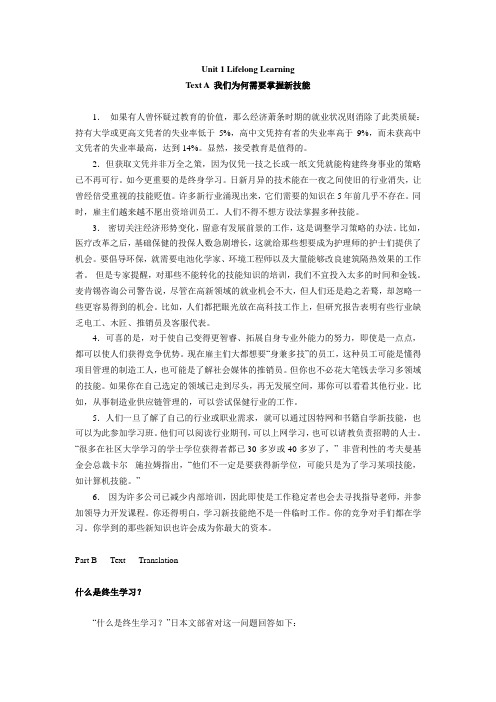
Unit 1 Lifelong LearningT ext A 我们为何需要掌握新技能1.如果有人曾怀疑过教育的价值,那么经济萧条时期的就业状况则消除了此类质疑:持有大学或更高文凭者的失业率低于5%,高中文凭持有者的失业率高于9%,而未获高中文凭者的失业率最高,达到14%。
显然,接受教育是值得的。
2.但获取文凭并非万全之策,因为仅凭一技之长或一纸文凭就能构建终身事业的策略已不再可行。
如今更重要的是终身学习。
日新月异的技术能在一夜之间使旧的行业消失,让曾经倍受重视的技能贬值。
许多新行业涌现出来,它们需要的知识在5年前几乎不存在。
同时,雇主们越来越不愿出资培训员工。
人们不得不想方设法掌握多种技能。
3.密切关注经济形势变化,留意有发展前景的工作,这是调整学习策略的办法。
比如,医疗改革之后,基础保健的投保人数急剧增长,这就给那些想要成为护理师的护士们提供了机会。
要倡导环保,就需要电池化学家、环境工程师以及大量能够改良建筑隔热效果的工作者。
但是专家提醒,对那些不能转化的技能知识的培训,我们不宜投入太多的时间和金钱。
麦肯锡咨询公司警告说,尽管在高新领域的就业机会不大,但人们还是趋之若鹜,却忽略一些更容易得到的机会。
比如,人们都把眼光放在高科技工作上,但研究报告表明有些行业缺乏电工、木匠、推销员及客服代表。
4.可喜的是,对于使自己变得更智睿、拓展自身专业外能力的努力,即使是一点点,都可以使人们获得竞争优势。
现在雇主们大都想要“身兼多技”的员工,这种员工可能是懂得项目管理的制造工人,也可能是了解社会媒体的推销员。
但你也不必花大笔钱去学习多领域的技能。
如果你在自己选定的领域已走到尽头,再无发展空间,那你可以看看其他行业。
比如,从事制造业供应链管理的,可以尝试保健行业的工作。
5.人们一旦了解了自己的行业或职业需求,就可以通过因特网和书籍自学新技能,也可以为此参加学习班。
他们可以阅读行业期刊,可以上网学习,也可以请教负责招聘的人士。
前景实用英语教案
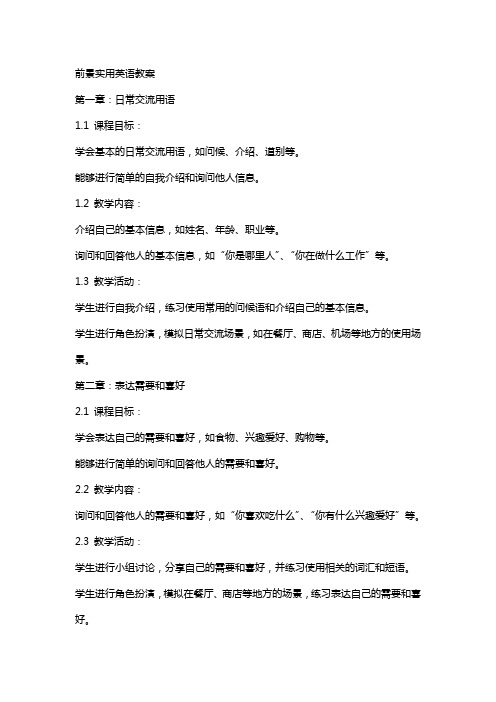
前景实用英语教案第一章:日常交流用语1.1 课程目标:学会基本的日常交流用语,如问候、介绍、道别等。
能够进行简单的自我介绍和询问他人信息。
1.2 教学内容:介绍自己的基本信息,如姓名、年龄、职业等。
询问和回答他人的基本信息,如“你是哪里人”、“你在做什么工作”等。
1.3 教学活动:学生进行自我介绍,练习使用常用的问候语和介绍自己的基本信息。
学生进行角色扮演,模拟日常交流场景,如在餐厅、商店、机场等地方的使用场景。
第二章:表达需要和喜好2.1 课程目标:学会表达自己的需要和喜好,如食物、兴趣爱好、购物等。
能够进行简单的询问和回答他人的需要和喜好。
2.2 教学内容:询问和回答他人的需要和喜好,如“你喜欢吃什么”、“你有什么兴趣爱好”等。
2.3 教学活动:学生进行小组讨论,分享自己的需要和喜好,并练习使用相关的词汇和短语。
学生进行角色扮演,模拟在餐厅、商店等地方的场景,练习表达自己的需要和喜好。
第三章:询问方向和地点3.1 课程目标:学会询问方向和地点,如问路、找到某个地方等。
能够准确地表达自己的位置和方向。
3.2 教学内容:常用的询问方向和地点的词汇和短语,如“请问在哪里”、“怎么走”等。
表达自己的位置和方向,如“我在超市的旁边”、“你往前走,左转”等。
3.3 教学活动:学生进行角色扮演,模拟在街头问路的情景,练习使用相关的词汇和短语。
学生进行小组活动,制作简单的地图,练习表达自己的位置和方向。
第四章:描述人和事物4.1 课程目标:学会描述人和事物的特征和属性,如外貌、性格、喜好等。
能够准确地表达自己的观察和看法。
4.2 教学内容:常用的描述人和事物的词汇和短语,如“高个子”、“善良的”、“喜欢音乐”等。
表达自己的观察和看法,如“我觉得他很聪明”、“她看起来很累”等。
4.3 教学活动:学生进行小组讨论,描述自己或他人的外貌和性格特点,并练习使用相关的词汇和短语。
学生进行角色扮演,模拟在面试或相亲等场合描述自己和对方的特征和属性。
前景实用英语综合教程2

前景实用英语综合教程2前景实用英语综合教程Practical English Comprehensive Course前言:Introduction《前景实用英语综合教程》是一本针对初学者设计的英语教材,旨在帮助学生提高英语听说读写能力。
本教程主要分为听力、口语、阅读和写作四个部分,通过多种练习形式,如对话、听力理解、口语表达、阅读理解和写作练习等,让学生全面掌握实用英语的基本技能。
<Preface> "Practical English Comprehensive Course" is anEnglish textbook designed for beginners, aiming to help students improve their English listening, speaking, reading, and writing skills. This tutorial is mainly divided into four parts: listening, speaking, reading, and writing. Through various exercises such as dialogues, listening comprehension, oral expression, reading comprehension, and writing exercises, students can comprehensively master the basic skills of practical English.第一部分:听力Part 1: Listening听力是语言学习的基础,也是交流的基本技能之一。
通过听力练习,学生能够提高对于英语语音、语调和语速的理解能力,提升听力水平。
本部分主要包括日常对话、新闻、访谈等各种题材的听力材料,学生通过听力理解题考察对于听力材料的理解和把握能力。
前景实用英语二A班unit1教案
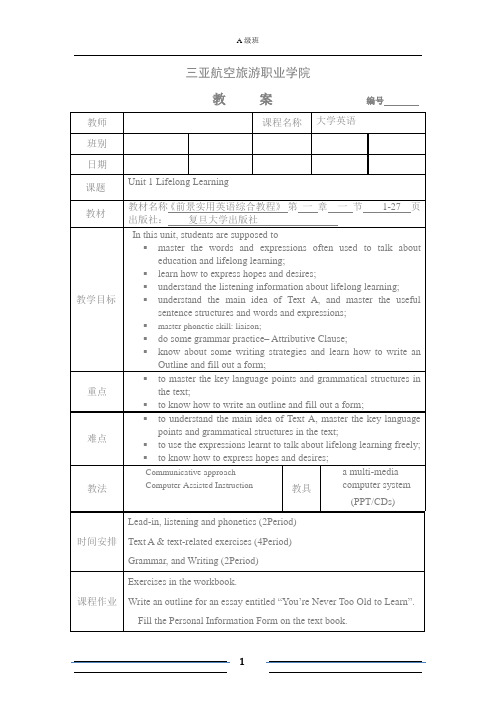
三亚航空旅游职业学院教案编号Unit 1 Lifelong Learning●Teaching MaterialForward English for Practical Purposes, Book 1, Unit 1●Teaching Aims:In this unit, students are supposed to1.master the words and expressions often used to talk about education andlifelong learning;2.learn how to express hopes and desires;3.understand the listening information about lifelong learning;4.understand the main idea of Text A, and master the useful sentence structuresand words and expressions;5.master phonetic skill: liaison;6.do some grammar practice– attributive clause;7.know about some writing strategies and learn how to write an Outline and fillout a form.●Teaching Emphasis1.to master the key language points and grammatical structures in the text;2.to know how to write an outline and fill out a form.●Teaching Difficulties1.to understand the main idea of Text A, master the key language points andgrammatical structures in the text.2.to use the expressions learnt to talk about lifelong learning freely.3.to express one’s hopes and desires.●Teaching ApproachesCommunicative approach and Computer-Assisted Instruction●Teaching Aidsa projectora multi-media computer system●Teaching Procedures and contents (8 periods)Part A Lead inTask 1Study the pictures and discuss the questions in small groups.1.Do you think it’s too late for middle-aged people to go to college?2.What does the second picture tell us?3.Why do you think lifelong learning is important?Task 2 Listen to the short dialogues and fill in the blanks.Task 4 Listen to the recording, and complete the passage.Task 5Discuss the following questions with your partner about your understanding of lifelong learning.1.Currently, it’s not easy for graduates with higher education degrees to find anideal job, so some people argue that education is of little use. What’s your view on this?2.How do you understand the saying “It’s never too old to learn”?Text AWhy We Need New SkillsLanguage and Cultural Points in the TextPara. 1recessionn. a general slowdown in economic activityNote: “The recession” here refers to the worldwide financial crisissince 2008 and its aftermath.erasev. to remove all traces of somethinge.g. He erased the pencil marks to keep the book clean.为保持书的整洁,他擦去了铅笔痕迹。
大学进阶英语综合教程2unit1作文范文
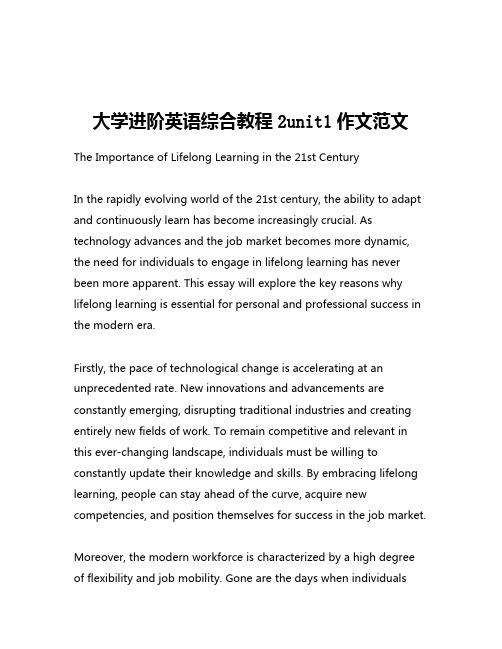
大学进阶英语综合教程2unit1作文范文The Importance of Lifelong Learning in the 21st CenturyIn the rapidly evolving world of the 21st century, the ability to adapt and continuously learn has become increasingly crucial. As technology advances and the job market becomes more dynamic, the need for individuals to engage in lifelong learning has never been more apparent. This essay will explore the key reasons why lifelong learning is essential for personal and professional success in the modern era.Firstly, the pace of technological change is accelerating at an unprecedented rate. New innovations and advancements are constantly emerging, disrupting traditional industries and creating entirely new fields of work. To remain competitive and relevant in this ever-changing landscape, individuals must be willing to constantly update their knowledge and skills. By embracing lifelong learning, people can stay ahead of the curve, acquire new competencies, and position themselves for success in the job market.Moreover, the modern workforce is characterized by a high degree of flexibility and job mobility. Gone are the days when individualscould expect to remain in the same career path for their entire working lives. Today, it is common for people to change jobs or even entire industries multiple times throughout their careers. Lifelong learning equips individuals with the adaptability and versatility needed to navigate these shifts. By continuously expanding their knowledge and skill set, people can seamlessly transition between different roles and industries, ensuring their long-term employability.In addition to the practical benefits, lifelong learning also holds significant personal and intellectual rewards. The process of acquiring new knowledge and skills can be deeply fulfilling, fostering a sense of personal growth and accomplishment. Furthermore, engaging in lifelong learning can lead to increased cognitive function, improved problem-solving abilities, and enhanced critical thinking skills. These attributes not only benefit individuals in their professional lives but also enrich their overall quality of life and personal relationships.Furthermore, lifelong learning is essential for addressing the complex challenges faced by modern societies. Global issues such as climate change, social inequalities, and public health crises require multifaceted solutions that draw upon a diverse range of knowledge and expertise. By embracing lifelong learning, individuals can contribute to the development of innovative approaches and collaborate with others to tackle these pressing problems. Thiscollaborative spirit and interdisciplinary mindset are crucial for creating a more sustainable and equitable future.Finally, lifelong learning fosters a sense of intellectual curiosity and a desire to continuously explore new frontiers of knowledge. In an era where information is readily available at our fingertips, the ability to critically evaluate, synthesize, and apply this knowledge becomes increasingly valuable. Lifelong learners are able to navigate the vast amount of information available, separating fact from fiction and constantly expanding the boundaries of their understanding.In conclusion, the importance of lifelong learning in the 21st century cannot be overstated. As the world becomes more interconnected and rapidly evolving, the ability to adapt, acquire new skills, and continuously expand one's knowledge is essential for personal and professional success. By embracing lifelong learning, individuals can position themselves for long-term employability, intellectual growth, and the ability to contribute to the betterment of society. In the face of the challenges and opportunities of the modern era, lifelong learning emerges as a crucial cornerstone for personal and societal progress.。
前景实用英语1unit2
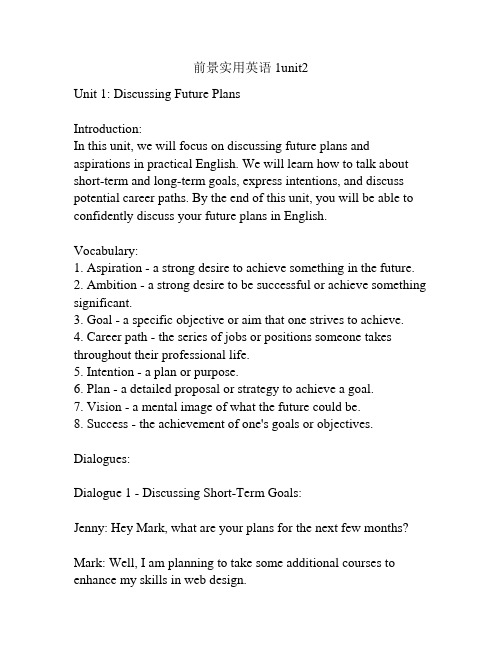
前景实用英语1unit2Unit 1: Discussing Future PlansIntroduction:In this unit, we will focus on discussing future plans and aspirations in practical English. We will learn how to talk about short-term and long-term goals, express intentions, and discuss potential career paths. By the end of this unit, you will be able to confidently discuss your future plans in English.Vocabulary:1. Aspiration - a strong desire to achieve something in the future.2. Ambition - a strong desire to be successful or achieve something significant.3. Goal - a specific objective or aim that one strives to achieve.4. Career path - the series of jobs or positions someone takes throughout their professional life.5. Intention - a plan or purpose.6. Plan - a detailed proposal or strategy to achieve a goal.7. Vision - a mental image of what the future could be.8. Success - the achievement of one's goals or objectives. Dialogues:Dialogue 1 - Discussing Short-Term Goals:Jenny: Hey Mark, what are your plans for the next few months? Mark: Well, I am planning to take some additional courses to enhance my skills in web design.Jenny: That sounds great! What is your goal behind taking those courses?Mark: My goal is to become a proficient web designer by the endof the year.Jenny: That's ambitious! I'm sure you can achieve it with your dedication.Mark: Thank you! I hope to secure a web design internship next summer to gain practical experience.Dialogue 2 - Talking about Long-Term Goals:Ryan: Sarah, have you thought about your long-term goals recently? Sarah: Yes, I have been thinking a lot about it. I want to start my own business someday.Ryan: That's fantastic! What type of business are you interested in starting?Sarah: I have always been passionate about fashion, so I am considering starting a clothing boutique.Ryan: That sounds like a great idea! I believe you have what it takes to make your boutique a success.Sarah: Thank you, Ryan! It will be a lot of hard work, but I amdetermined to achieve my dream.Dialogue 3 - Discussing Career Paths:Lisa: John, have you decided what career path you want to pursue? John: Yes, I have always been interested in medicine, so I plan to become a doctor.Lisa: That's a noble profession. How do you plan to achieve your goal?John: I am currently studying pre-med and plan to apply to medical school after graduation.Lisa: That's impressive! I'm sure you will make a great doctor one day.John: Thank you, Lisa. It's a long journey, but I am excited about the possibilities.Grammar Points:1. Using the present continuous tense to talk about future plans: Example: I am planning to travel to Europe next summer.2. Using modal verbs to express intentions and possibilities: Example: I hope to secure a job in finance after completing mydegree.3. Using future tense to discuss long-term goals:Example: I will start my own business in five years.4. Using present tense to talk about aspirations and career paths: Example: I have always been interested in becoming a teacher.5. Using adverbs of time to indicate future plans:Example: I am planning to take a vacation next month. Conclusion:In this unit, we have learned how to discuss future plans in practical English. We have explored vocabulary related to aspirations, goals, intentions, and career paths. We have also practiced using different tenses and modal verbs to express future plans and ambitions. With these skills, you will be able to confidently communicate your future plans in English.。
前景实用英语 2 unit 1 lifelong learning
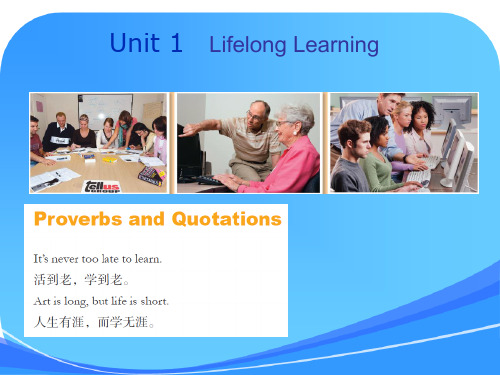
Part A Lead in
Task 3 Discuss the following questions.
1. Currently, it’s not easy for graduates with higher education degrees to find an ideal job, so some people argue that education is of little use. What’s your view on this?
are what employers ___l_o_o_k_f_o_r___. W: Agree. That’s why I’ve been teaching myself new things.
Part A Lead in
Task 2 Listen to the following short dialogues and fill in the blanks.
Part A Lead in
Task 2 Listen to the following short dialogues and fill in the blanks.
Dialogue 1
M: Hi, what have you been ___u__p_t_o___ recently? W: Study. You know, the exam is coming in two weeks. M: Exam? What exam? W: Oh, you don’t know. It’s for a certificate in ___c_o_m_p__u_te_r__s_k_il_ls__. M: Great. Those skills are necessary and widely used. W: Right. Plus, I want to learn something ___b_e_y_o__n_d___ my major. M: That’s good. It’s better to ___e_q_u_i_p___ ourselves with multiple skills, which
前景实用英语2unit1课后答案
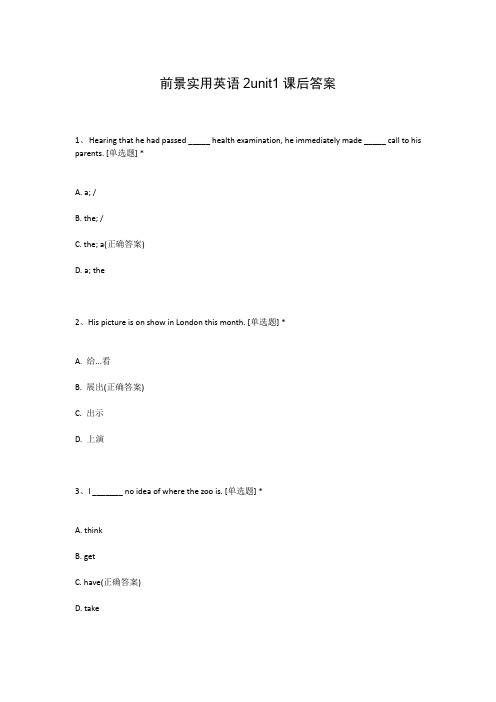
前景实用英语2unit1课后答案1、Hearing that he had passed _____ health examination, he immediately made _____ call to his parents. [单选题] *A. a; /B. the; /C. the; a(正确答案)D. a; the2、His picture is on show in London this month. [单选题] *A. 给...看B. 展出(正确答案)C. 出示D. 上演3、I _______ no idea of where the zoo is. [单选题] *A. thinkB. getC. have(正确答案)D. take4、A brown bear escaped from the zoo, which was a()to everyone in the town. [单选题] *A. HarmB. violenceC. hurtD. threat(正确答案)5、Finally he had to break his promise. [单选题] *A. 计划B. 花瓶C. 习惯D. 诺言(正确答案)6、He can’t meet his friends tonight because he _______ do homework. [单选题] *A. has to(正确答案)B. needC. have toD. don’t have to7、It' s a pity that we have to stay at home when we are having()weather. [单选题] *A. so fineB. so fine aC. such fine(正确答案)D. such a fine8、In fact, Beethoven did something brave than dying. [单选题] *A. 勇敢(正确答案)B. 冒险C. 可怕D. 奇妙9、Mary _______ a phone call with her mother now. [单选题] *A. will makeB. madeC. is making(正确答案)D. makes10、John Smith is _______ of the three young men. [单选题] *A. strongB. strongerC. the strongerD. the strongest(正确答案)11、It _______ him ten minutes to solve the problem. [单选题] *A. spentB. took(正确答案)C. costD. paid12、I do not have my own room,_____. [单选题] *A. neither does Tom(正确答案)B. neither has TomC. so does TomD. so has Tom13、____ father is a worker. [单选题] *A.Mike's and Mary'sB. Mike and Mary's(正确答案)C. Mike's and MaryD. Mike and Marys'14、We got up early this morning and took a long walk after breakfast. We walked _____ thebusiness section of the city. [单选题] *A. amongB. betweenC. through(正确答案)D. upon15、_______ a busy afternoon! [单选题] *A. HowB. What(正确答案)C. WhichD. Wish16、She _______ love cats, but one attacked her and she doesn’t like them anymore. [单选题]*A. got used toB. was used toC. was used forD. used to(正确答案)17、Be _______ when you are driving. [单选题] *A. afraidB. careful(正确答案)C. clearD. clean18、Growing vegetables()constantly watering. [单选题] *A. neededB. are neededC. were neededD. needs(正确答案)19、It’s usually windy in spring, ______ you can see lots of people flying kites.()[单选题] *A. so(正确答案)B. orC. butD. for20、What’s your _______ for the coming new year? [单选题] *A. playB. plantC. plan(正确答案)D. plans21、( )He gave us____ on how to keep fit. [单选题] *A. some advicesB. some advice(正确答案)C. an adviceD. a advice22、--_______ are the birds doing?--They are singing in a tree. [单选题] *A. WhoB. What(正确答案)C. HowD. Where23、This is _________ my father has taught me—to always face difficulties and hope for the best. [单选题] *A. howB. whichC. that(正确答案)D. what24、This kind of banana tastes very _______. [单选题] *A. nice(正确答案)B. wellC. nicelyD. better25、He gathered his courage and went on writing music. [单选题] *A. 从事B. 靠······谋生C. 继续(正确答案)D. 致力于26、Have you kept in()with any of your friends from college? [单选题] *A. contractB. contact(正确答案)C. continentD. touching27、The blue shirt looks _______ better on you than the red one. [单选题] *A. quiteB. moreC. much(正确答案)D. most28、I often _______ music from the Internet. [单选题] *A. download(正确答案)B. spendC. saveD. read29、( ). I’m _____ in that ______ film [单选题] *A. interesting interestedB. interested interesting(正确答案)C. interested interestedD. interesting interesting30、78.—Welcome to China. I hope you'll enjoy the ________.—Thank you. [单选题] * A.tour(正确答案)B.sizeC.nameD.colour。
前景实用英语综合教程2第三版答案

前景实用英语综合教程2第三版答案1、13.—Will you come to my party?—I am not ________ . [单选题] *A.mindB.sure(正确答案)C.happyD.Sorry2、—______ do you pay for it? —Over the Internet. ()[单选题] *A. WhatB. How muchC. How(正确答案)D. When3、The children are playing wildly and making a lot of?_______. [单选题] *A. cryB. voicesC. noises(正确答案)D. music4、—Does your grandpa live ______ in the country?—Yes. So I often go to visit him so that he won’t feel ______. ()[单选题] *A. alone; aloneB. lonely; lonelyC. lonely; aloneD. alone; lonely(正确答案)5、Since we have _____ money left,we can't afford the expensive computer. [单选题] *A. a littleB. a fewC. little(正确答案)D. few6、6.Hi, boys and girls. How are you ________ your posters for the coming English Festival at school? [单选题] *A.getting onB.getting offC.getting with (正确答案)D.getting7、By the end of this month, all this _____. [单选题] *A. is changedB.will changeC. will have changed(正确答案)D. has changed8、( ) Do you have any difficulty _____ these flowers?I’d like to help you if you need.[单选题] *A in planting(正确答案)B for plantingC with plantingD to plant9、The manager gave one of the salesgirls an accusing look for her()attitude towards customers. [单选题] *A. impartialB. mildC. hostile(正确答案)D. opposing10、45.—Let's make a cake ________ our mother ________ Mother's Day.—Good idea. [单选题] *A.with; forB.for; on(正确答案)C.to; onD.for; in11、Do you know what()the change in his attitude? [单选题] *A. got throughB. brought about(正确答案)C. turned intoD. resulted from12、_____ the project, we'll have to work two more weeks. [单选题] *A. CompletingB. CompleteC. Having completedD.To complete(正确答案)13、Many young people like to _______ at weekends. [单选题] *A. eat out(正确答案)B. eat upC. eat onD. eat with14、—Is there ______ else I can do for you? —No, thanks. I can manage it myself.()[单选题] *A. everythingB. anything(正确答案)C. nothingD. some things15、I run out of money. Could you _______ me some?[单选题] *A. lend(正确答案)B. sellC. borrowD. buy16、These apples smell _____ and taste ______. [单选题] *A. well; wellB. good; good(正确答案)C. well; goodD. good; well17、The family will have _______ good time in Shanghai Disneyland. [单选题] *A. theB. a(正确答案)C. anD. /18、82.—Is there a bookshop near here?—Yes. Walk ________ the road for five minutes and you'll see one near a big tree. [单选题] *A.toB.along(正确答案)C.ofD.about19、He has made a lot of films, but ____ good ones. [单选题] *A. anyB. someC. few(正确答案)D. many20、He held his()when the results were read out. [单选题] *A. breath(正确答案)B. voiceC. soundD. thought21、Will you be able to finish your homework _______? [单选题] *A. by the timeB. in time(正确答案)C. once upon a timeD. out of time22、54.—________?—Yes, please. I'd like some beef. [单选题] *A.What do you wantB.May I try it onC.Can I help you(正确答案)D.What else do you want23、The commander said that two _____ would be sent to the Iraqi front line the next day. [单选题] *A. women's doctorB. women doctorsC. women's doctorsD. women doctor(正确答案)24、We _____ three major snowstorms so far this winter. [单选题] *A.hadB. haveC. have had(正确答案)D.had had25、Will you see to()that the flowers are well protected during the rainy season? [单选题] *A. it(正确答案)B. meC. oneD. yourself26、—Why is Mary asking Bob about the school trip? —Because she wants to know ______.()[单选题] *A. how does he think of the tripB. what does he think of the tripC. what he likes the tripD. how he likes the trip(正确答案)27、I have seldom seen my father()pleased with my progress as he is now. [单选题] *A. so(正确答案)B. veryC. tooD. rather28、94.—Let’s go out for a picnic on Sunday.—________. [单选题] *A.Nice to meet youB.Here you areC.The same to youD.Good idea(正确答案)29、We are very hungry now. Can you _______ us something to eat? [单选题] *A. carryB. takeC. borrowD. bring(正确答案)30、?I am good at schoolwork. I often help my classmates _______ English. [单选题] *A. atB. toC. inD. with(正确答案)。
前景实用英语综合教程第2册教学反思
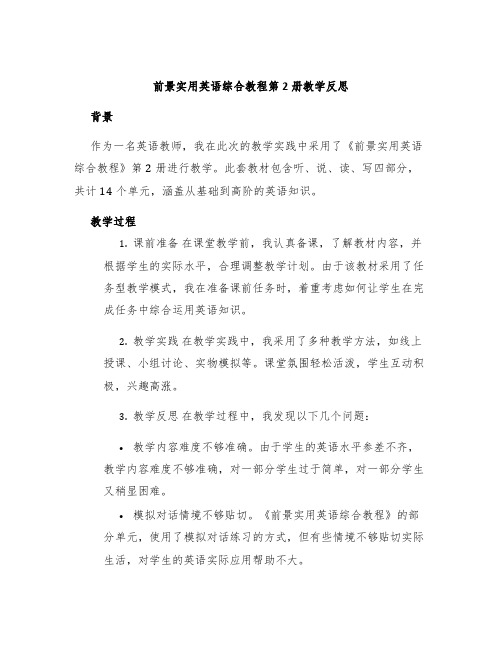
前景实用英语综合教程第2册教学反思背景作为一名英语教师,我在此次的教学实践中采用了《前景实用英语综合教程》第2册进行教学。
此套教材包含听、说、读、写四部分,共计14个单元,涵盖从基础到高阶的英语知识。
教学过程1.课前准备在课堂教学前,我认真备课,了解教材内容,并根据学生的实际水平,合理调整教学计划。
由于该教材采用了任务型教学模式,我在准备课前任务时,着重考虑如何让学生在完成任务中综合运用英语知识。
2.教学实践在教学实践中,我采用了多种教学方法,如线上授课、小组讨论、实物模拟等。
课堂氛围轻松活泼,学生互动积极,兴趣高涨。
3.教学反思在教学过程中,我发现以下几个问题:•教学内容难度不够准确。
由于学生的英语水平参差不齐,教学内容难度不够准确,对一部分学生过于简单,对一部分学生又稍显困难。
•模拟对话情境不够贴切。
《前景实用英语综合教程》的部分单元,使用了模拟对话练习的方式,但有些情境不够贴切实际生活,对学生的英语实际应用帮助不大。
•任务型教学过于强调任务,忽略内容。
在教学中,我们一度将任务型教学过于强调任务完成,而忽略了英语知识点的讲解。
这种做法虽然让学生在任务中综合运用英语知识,但未能完全将英语知识点传授给学生。
教学收获1.学生在任务型教学中表现出色。
在课堂上,学生完成任务后,自主分享自己的完成情况,非常有成就感。
2.小组讨论可有效激发学生学习兴趣。
我们采用小组讨论的方式,让学生的英语表达更为自由,也让学生对英语学习产生浓厚兴趣。
3.实物模拟可让学生更好地理解英语知识。
我们在实物模拟中使用了生动形象的实物,让学生更好地理解英语知识。
总结在教学中,我们应该注重教学内容的准确度,采用多种教学方法,让学生在灵活多样的教学方式中更好地掌握英语知识。
我们要强调任务型教学中内容的讲解,让学生在任务中综合运用英语知识的同时,也达到完全掌握英语知识点的目的。
前景基础英语第二册练习答案
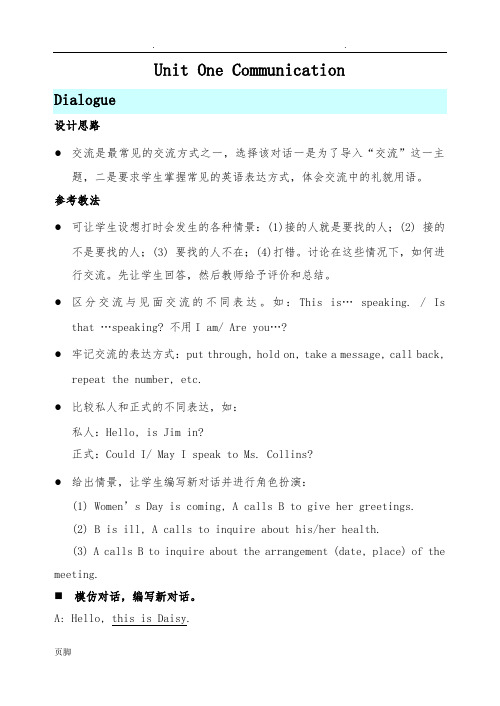
Unit One CommunicationDialogue设计思路●交流是最常见的交流方式之一,选择该对话一是为了导入“交流”这一主题,二是要求学生掌握常见的英语表达方式,体会交流中的礼貌用语。
参考教法●可让学生设想打时会发生的各种情景:(1)接的人就是要找的人;(2) 接的不是要找的人;(3) 要找的人不在;(4)打错。
讨论在这些情况下,如何进行交流。
先让学生回答,然后教师给予评价和总结。
●区分交流与见面交流的不同表达。
如:This is…speaking. / Isthat …speaking? 不用I am/ Are you…?●牢记交流的表达方式:put through, hold on, take a message, call back,repeat the number, etc.●比较私人和正式的不同表达,如:私人:Hello, is Jim in?正式:Could I/ May I speak to Ms. Collins?●给出情景,让学生编写新对话并进行角色扮演:(1) Women’s Day is coming, A calls B to give her greetings.(2) B is ill, A calls to inquire about his/her health.(3) A calls B to inquire about the arrangement (date, place) of the meeting.模仿对话,编写新对话。
Language Points in the Dialogue1. Can I take a message?接人:您要留言吗?Can I leave a message? 打人:我可以留言吗?2. hold on:e.g. The manager asked him to hold on while he made a phone.经理让他稍等一会,他去打个。
终身学习对未来工作和生活的影响英语作文
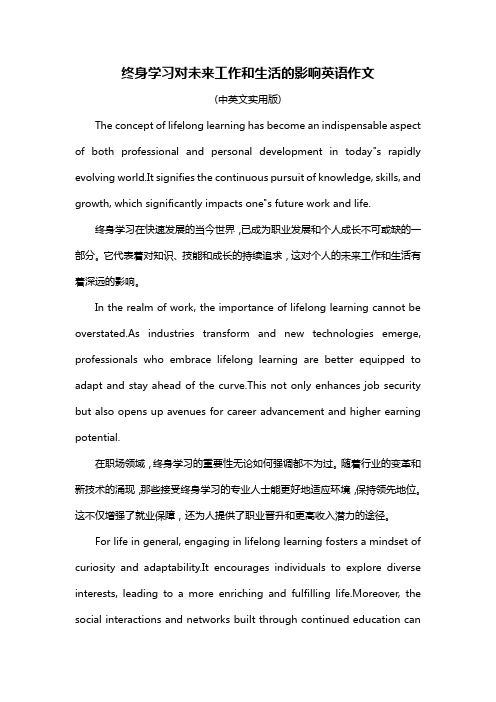
终身学习对未来工作和生活的影响英语作文(中英文实用版)The concept of lifelong learning has become an indispensable aspect of both professional and personal development in today"s rapidly evolving world.It signifies the continuous pursuit of knowledge, skills, and growth, which significantly impacts one"s future work and life.终身学习在快速发展的当今世界,已成为职业发展和个人成长不可或缺的一部分。
它代表着对知识、技能和成长的持续追求,这对个人的未来工作和生活有着深远的影响。
In the realm of work, the importance of lifelong learning cannot be overstated.As industries transform and new technologies emerge, professionals who embrace lifelong learning are better equipped to adapt and stay ahead of the curve.This not only enhances job security but also opens up avenues for career advancement and higher earning potential.在职场领域,终身学习的重要性无论如何强调都不为过。
随着行业的变革和新技术的涌现,那些接受终身学习的专业人士能更好地适应环境,保持领先地位。
这不仅增强了就业保障,还为人提供了职业晋升和更高收入潜力的途径。
前景英语教材2语法及写作答案
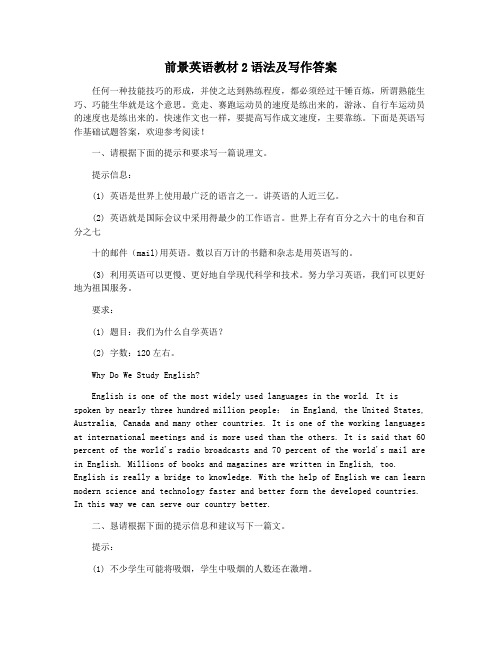
前景英语教材2语法及写作答案任何一种技能技巧的形成,并使之达到熟练程度,都必须经过干锤百炼,所谓熟能生巧、巧能生华就是这个意思。
竞走、赛跑运动员的速度是练出来的,游泳、自行车运动员的速度也是练出来的。
快速作文也一样,要提高写作成文速度,主要靠练。
下面是英语写作基础试题答案,欢迎参考阅读!一、请根据下面的提示和要求写一篇说理文。
提示信息:(1) 英语是世界上使用最广泛的语言之一。
讲英语的人近三亿。
(2) 英语就是国际会议中采用得最少的工作语言。
世界上存有百分之六十的电台和百分之七十的邮件(mail)用英语。
数以百万计的书籍和杂志是用英语写的。
(3) 利用英语可以更慢、更好地自学现代科学和技术。
努力学习英语,我们可以更好地为祖国服务。
要求:(1) 题目:我们为什么自学英语?(2) 字数:120左右。
Why Do We Study English?English is one of the most widely used languages in the world. It is spoken by nearly three hundred million people: in England, the United States, Australia, Canada and many other countries. It is one of the working languages at international meetings and is more used than the others. It is said that 60 percent of the world's radio broadcasts and 70 percent of the world's mail are in English. Millions of books and magazines are written in English, too. English is really a bridge to knowledge. With the help of English we can learn modern science and technology faster and better form the developed countries. In this way we can serve our country better.二、恳请根据下面的提示信息和建议写下一篇文。
- 1、下载文档前请自行甄别文档内容的完整性,平台不提供额外的编辑、内容补充、找答案等附加服务。
- 2、"仅部分预览"的文档,不可在线预览部分如存在完整性等问题,可反馈申请退款(可完整预览的文档不适用该条件!)。
- 3、如文档侵犯您的权益,请联系客服反馈,我们会尽快为您处理(人工客服工作时间:9:00-18:30)。
综合教程 2 Unit 1 Lifelong Learning
Unit 1 Lifelong Learning
Unit 1 Lifelong Learning
Part A
Lead in Text Exercises
Part B
Lead in Text Exercises
b. Yes, I think it may be a bit difficult for them to pass the examinations if they study at college. Instead, I think they can just learn something interesting at home at their leisure time. It’s fun to learn without pressure.
I think it’s trying to tell us that we need to engage ourselves in lifetime training and learning if we want to improve ourselves and get higher wages.
1. Do you think it’s too late for middle-aged people to go to college?
Cues: eager, learning, knowledge, praise-worthy
2. What does the second picture tell us?
Part A Lead in
Task 1 Study the pictures and discuss the questions below in small groups. Use the words given below if necessary.
1. Do you think it’s too late for middle-aged people to go to college?
Part C
Phonetics
Grammar Writing
Functions and Notions Works 1 Task 2
Task 3
Part A Lead in
Task 1 Study the pictures and discuss the questions below in small groups. Use the words given below if necessary.
are what employers ___l_o_o_k_f_o_r___. W: Agree. That’s why I’ve been teaching myself new things.
Part A Lead in
Task 2 Listen to the following short dialogues and fill in the blanks.
Dialogue 1
M: Hi, what have you been ___u__p_t_o___ recently? W: Study. You know, the exam is coming in two weeks. M: Exam? What exam? W: Oh, you don’t know. It’s for a certificate in ___c_o_m_p__u_te_r__s_k_il_ls__. M: Great. Those skills are necessary and widely used. W: Right. Plus, I want to learn something ___b_e_y_o__n_d___ my major. M: That’s good. It’s better to ___e_q_u_i_p___ ourselves with multiple skills, which
Cues: improve, wages, training, lifetime learning
3. Why do you think lifelong learning is important?
Cues: build skills and knowledge, young, active, open to new experiences
a. No, I don’t think so. As the saying goes, “It’s never too old to learn.” Their going to college suggests that they are eager for new knowledge, so it’s praise-worthy and we should learn from them .
Part A Lead in
Task 1 Study the pictures and discuss the questions below in small groups. Use the words given below if necessary.
2. What does the second picture tell us?
3. Why do you think lifelong learning is important?
I think lifelong learning helps build your skills and knowledge. It keeps your brain young and active. If you seek knowledge and learning throughout life, you will always be open to new experiences and will never get bored.
